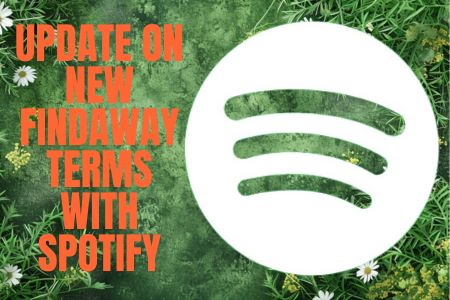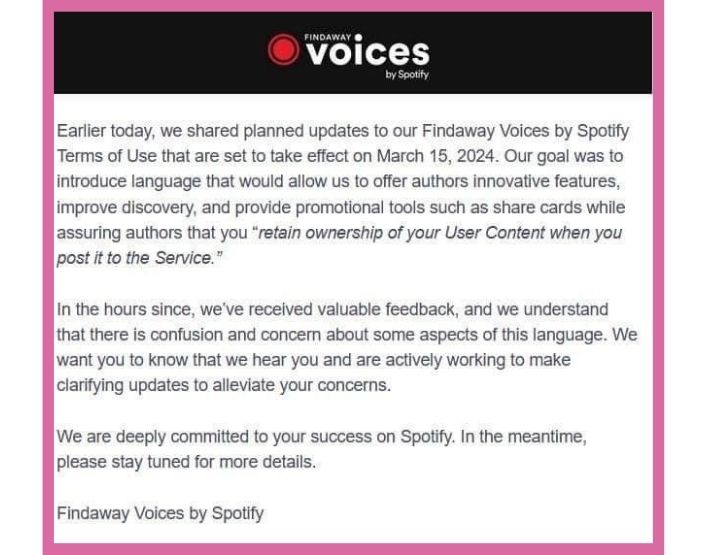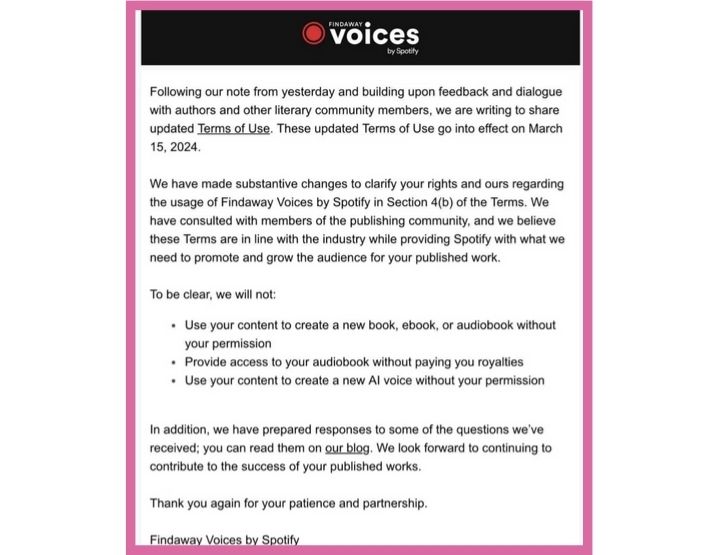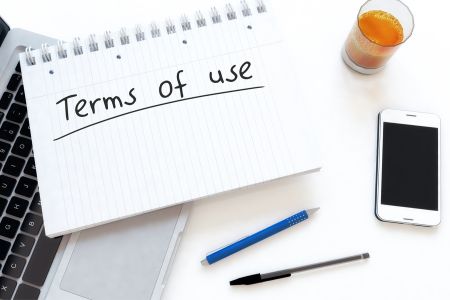
I've been meaning to do
an update on the new Spotify and Findaway Voices terms of use kerfuffle
which I talked about in a previous post. That got resolved very
quickly after the authors who were part of Findaway Voices staged a
massive protest. Sadly, life and health got in the way, so I'm only just
doing it now. It's probably old news, but I'm still seeing some people ask
about it, so here's the low down.
On 8
November, 2023 Spotify updated their terms of service. Unwittingly,
Findaway Voices after they were acquired by Spotify updated their terms of
services for audiobooks to authors with a wholesale copy and paste of the
Spotify terms without checking them. That's my guess anyway, who knows exactly what happened?Authors who were distributing their audiobooks to Spotify via Findaway were outraged and claimed it was a rights grab. Much anger and drama ensued. Many authors started to immediately boycott Spotify and Findaway, starting to pull their audiobooks off the platform.
I decided to take a wait-and-see approach when I first talked about it because experience has shown me that things do change when enough people make noise. And a lot of people made noise. Big shout out to the authors who made waves and who made change happen.
Also big shout out to Findaway for changing their terms so quickly. The whole thing went down on February 16th, 2024 and Findaway released new terms on February 17th. The very next day. You can't say they didn't respond fast even if you're not super happy with the results. I'm going to give them points for responding.

If you're in the TL:DR camp, here's what Findaway had to say about their terms of use after the initial author reactions:

And their explanation after the new terms of use was published:


And if you're into detail, below are the nuts and bolts of what Findaway have done, based on my limited, non-legal understanding.
To begin with, here's the original Spotify terms:
And below are the before and after of the Findaway terms:
You'll notice some differences in the new terms. For one, they are longer, for another there are some added clauses, so here's a breakdown of everything for you. But before I do that, here's my big fat disclaimer again.
Before I continue, here's my small disclaimer. THIS IS NOT LEGAL ADVICE. Just so we're clear, I don't have any legal training - I'm not a lawyer, nor have I studied law. The explanations I provide about the new Findaway terms are based on how I understand them as a regular person, not a professional legal analysis. When it comes to copyright laws and your actual rights, it's best to double check with a lawyer who specializes in entertainment and IP. Legal agreements can be complicated, and courts may interpret things differently case by case depending on the specific situation. So while I did my best to explain what I think the terms mean, you'll want to get advice from a qualified legal expert before making any decisions based on my non-lawyer interpretations. I can only provide a layperson's understanding, not professional legal counsel. You probably want to talk to someone with entertainment law or intellectual property law expertise. Any mistakes in what I'm saying below are mine alone and I apologize.

Now here's my non-legal interpretation of that text, based on my non-legal background understanding:
I know a lot of people might not care about this level of detail, but it's here if you want to read about it. So to break it down a little further, here's a small comparison of the differences between the old terms and the new terms.
Please remember that I am not a lawyer and I do not have any legal background, particularly in the entertainment and intellectual property space. Do consult a lawyer if you are at all concerned about your rights.

And to wrap it all up, here are some final thoughts...
I know there are still authors out there who are unhappy with what's been presented, but I feel that Findaway responding so quickly and having amended their terms is a positive step to show that they've listened to their customers, ie, the authors. Ultimately, the decision whether or not to distribute to Spotify via Findaway the author's choice. All I have to say is do your due diligence and go with what feels right for you. And if you're not sure, check with your lawyer.
My closing thoughts from the previous post was that Findaway would do something, and they did. The rest is up to you as an author and your decision entirely. I wish you all the best in your audiobook journey.
Find me everywhere:




If you're in the TL:DR camp, here's what Findaway had to say about their terms of use after the initial author reactions:

And their explanation after the new terms of use was published:


And if you're into detail, below are the nuts and bolts of what Findaway have done, based on my limited, non-legal understanding.
To begin with, here's the original Spotify terms:
Licenses that you
grant us
User
Content
You retain ownership of your User Content when
you post it to the Service. However, in order for us to make your User
Content available on the Spotify Service and to provide you with certain
features and functions, we do need a limited license from you to that
User Content. Accordingly, you hereby grant to Spotify a non-exclusive,
transferable, sub-licensable, royalty-free, fully paid, irrevocable,
worldwide license to reproduce, make available, perform and display,
translate, modify, create derivative works from, distribute, and
otherwise use any such User Content through any medium, whether alone or
in combination with other Content or materials, in any manner and by any
means, method or technology, whether now known or hereafter created.
Where applicable and to the extent permitted under applicable law, you
also agree to waive, and not to enforce, any "moral rights" or
equivalent rights, such as your right to be identified as the author of
any User Content, including Feedback, and your right to object to
derogatory treatment of such User Content. This clause does not
otherwise modify Spotify's obligation to use your User Content in
accordance with the licence above.
And below are the before and after of the Findaway terms:
Original terms by Findaway which was just a copy and paste of the Spotify terms (oops!):
You retain ownership of your User Content when you post it to the Service. However, in order for us to make your User Content available on the Spotify Service and to provide you with certain features and functions, we do need a limited license from you to that User Content. Accordingly, you hereby grant to Spotify a non-exclusive, transferable, sub-licensable, royalty-free, fully paid, irrevocable, worldwide license to reproduce, make available, perform and display, translate, modify, create derivative works from, distribute, and otherwise use any such User Content through any medium, whether alone or in combination with other Content or materials, in any manner and by any means, method or technology, whether now known or hereafter created. Where applicable and to the extent permitted under applicable law, you also agree to waive, and not to enforce, any "moral rights" or equivalent rights, such as your right to be identified as the author of any User Content, including Feedback, and your right to object to derogatory treatment of such User Content. This clause does not otherwise modify Spotify's obligation to use your User Content in accordance with the licence above.
New terms by Findaway after the kerfuffle:
Licenses that you grant to us
User Content
You retain ownership of your User Content when you post it to the Service. However, in order for us to provide the Service to you and distribute your User Content, we do need a limited license from you to that User Content. Accordingly, and without limiting any payment obligations under Section 5 herein, you hereby grant Spotify a non-exclusive, worldwide license to reproduce, make available, perform, display, distribute, and otherwise use your User Content on and in connection with the Spotify Service and the Distribution Services (as defined in Section 5). This license permits the use of the User Content by Spotify for systems and product management and development, testing, training, modeling, and implementation in connection with anti-piracy and anti-fraud measures and the discoverability, promotion, marketing, curation, distribution, and sale (or developing the user experience in connection therewith) of the User Content and the Spotify Service. Spotify’s distribution partners also have the right to distribute your User Content via the Distribution Services, subject to your right to discontinue distribution as described below in this Section 4 and/or to opt out from particular Distribution Partners as described in Section 5. For the sake of clarity, these Terms do not authorize Spotify to use User Content to create a new book, ebook or audiobook, or to use User Content to create a new, machine-generated voice without your permission.
You also agree that, if you create your User Content with one or more collaborators, you will ensure that each such collaborator has granted to you all of the rights that you need in order for you to grant the licenses that you grant to us herein in such User Content.
Discontinuation of Distribution
You may request that Spotify cease to distribute the User Content at any time through the distribution workflow in the Service; provided, however, that Spotify and its distribution partners shall be permitted to continue providing users who purchased access to User Content prior to your withdrawal with continued access to such User Content. Spotify will make commercially reasonable efforts to remove the User Content within 30 business days of receipt of such notification from you, subject to these Terms, the Payment Terms, and any applicable distribution partner terms. You acknowledge that such removal requires action on the part of Spotify's distribution partners and may take longer than 30 business days to complete.
Feedback
If you provide feedback, ideas or suggestions to Spotify in connection with the Service or ("Feedback"), you acknowledge that the Feedback is not confidential and you authorize Spotify to use that Feedback without restriction and without payment to you. Feedback is considered a type of User Content.
You'll notice some differences in the new terms. For one, they are longer, for another there are some added clauses, so here's a breakdown of everything for you. But before I do that, here's my big fat disclaimer again.
Before I continue, here's my small disclaimer. THIS IS NOT LEGAL ADVICE. Just so we're clear, I don't have any legal training - I'm not a lawyer, nor have I studied law. The explanations I provide about the new Findaway terms are based on how I understand them as a regular person, not a professional legal analysis. When it comes to copyright laws and your actual rights, it's best to double check with a lawyer who specializes in entertainment and IP. Legal agreements can be complicated, and courts may interpret things differently case by case depending on the specific situation. So while I did my best to explain what I think the terms mean, you'll want to get advice from a qualified legal expert before making any decisions based on my non-lawyer interpretations. I can only provide a layperson's understanding, not professional legal counsel. You probably want to talk to someone with entertainment law or intellectual property law expertise. Any mistakes in what I'm saying below are mine alone and I apologize.

Now here's my non-legal interpretation of that text, based on my non-legal background understanding:
What the old terms mean:
- User retains ownership of content when posted to Spotify service
- User grants Spotify a license to their content
- License is described as non-exclusive
- License allows Spotify to reproduce, make available, perform and display the content
- License allows Spotify to translate and create derivative works from the content
- License allows Spotify to distribute and otherwise use the content
- License applies to use of content through any medium/technology
- License is granted on a worldwide basis
- Conditions around modification or enforcement of moral rights are defined
- Clarifies the license does not otherwise modify Spotify's obligations
- Involves granting rights to user-generated "User Content"
- Core concept of ownership retention by user alongside licensing rights to Spotify
What the new terms mean:
- User retains ownership of content when posted to Spotify service
- User grants Spotify a non-exclusive, worldwide license to their content
- License allows Spotify to reproduce, make available, perform, display, distribute, and use the content
- Specifically permits use on and in connection with Spotify service and distribution services
- Allows content use by Spotify for system/product management, testing, modeling related to anti-piracy/fraud measures
- Also permits use for content discoverability, promotion, marketing, curation, distribution and sale
- Grants rights for Spotify to use content in developing user experience for these areas
- Spotify's distribution partners also have rights to distribute content via distribution services
- However, user can discontinue distribution or opt-out of specific partners
- Terms do not authorize Spotify to create new books/ebooks/audiobooks from content
- Or to create new machine-generated voices without permission
- User must ensure any collaborators grant necessary rights for license to Spotify
I know a lot of people might not care about this level of detail, but it's here if you want to read about it. So to break it down a little further, here's a small comparison of the differences between the old terms and the new terms.
Similarities between the new and old terms:
- User retains ownership of content when posted to Spotify
- User grants Spotify a license to their content
- License is described as non-exclusive
- License allows Spotify to reproduce, make available, perform and display the content
- License allows Spotify to translate and create derivative works from the content
- License allows Spotify to distribute and otherwise use the content
- License applies to use of content through any medium/technology
- License is granted on a worldwide basis
- Conditions around modification or enforcement of moral rights are the same
- Clarifies the license does not otherwise modify Spotify's obligations
- Both involve granting rights to user-generated "User Content"
- Core concept of ownership retention by user alongside licensing rights to Spotify is consistent
Differences between the new and old terms, when comparing the two:
- The new terms specify the license allows distribution, while the old terms do not mention distribution explicitly.
- The new terms outline specific permitted uses around anti-piracy, discoverability, promotion, marketing, etc. The old terms do not provide this level of detail.
- The new terms confirm distribution partners have rights to distribute, subject to user opt-out. This is not in the old terms.
- The new terms include limitations around new books/voices, the old terms do not specify any limitations.
- The new terms reference use of content "on and in connection with" Spotify/distribution services. The old terms do not include this phrasing.
- The new terms discuss use of content for "systems and product management and development, testing, training, modeling". The old terms do not specify these uses.
- The new terms reference developing "user experience" around curation/distribution/sale. The old terms do not include this language.
- The new terms include a provision about ensuring collaborators grant necessary rights. The old terms have no such provision.
To summarize, the key differences are the new terms provide more detail on distribution rights, permitted uses, limitations, and address distribution partners and collaborators, while the old terms are more high-level.
Please remember that I am not a lawyer and I do not have any legal background, particularly in the entertainment and intellectual property space. Do consult a lawyer if you are at all concerned about your rights.

And to wrap it all up, here are some final thoughts...
Based on the analysis
above, I think there are reasonable arguments that the new terms are an
improvement for users:
Pros of the new terms:
-
Provide more clarity and specificity around key areas like distribution, permitted uses, and limitations. This gives users better transparency into how their content will be handled.
-
Outline additional protections like the ability to opt-out of specific distribution partners and prohibiting unauthorized derivative works. These strengthen user control and rights.
-
Address collaborator licensing, which provides safeguards for content involving multiple creators.
-
Increased details are generally beneficial for users to fully understand the scope of the agreement.
However, there could still be some unclear areas and room for
improvement:
-
More nuanced legal analysis may find other ambiguities or issues not explored here.
-
Users would still need to consult a lawyer to verify how changes impact their specific situations and country.
-
Spotify may have balanced user/business interests in ways not entirely apparent without their perspective.
On balance, I think the increased transparency, clarified
permissions/limitations, and additional user controls/opt-outs in the new
terms represent a net positive for authors using the platform. But a legal
review would provide more definitive guidance. Overall the new terms seem
to better balance protecting user rights alongside Spotify's operational
needs, but as I've said repeatedly, if you are uncertain about anything,
seek professional legal advice.
I know there are still authors out there who are unhappy with what's been presented, but I feel that Findaway responding so quickly and having amended their terms is a positive step to show that they've listened to their customers, ie, the authors. Ultimately, the decision whether or not to distribute to Spotify via Findaway the author's choice. All I have to say is do your due diligence and go with what feels right for you. And if you're not sure, check with your lawyer.
My closing thoughts from the previous post was that Findaway would do something, and they did. The rest is up to you as an author and your decision entirely. I wish you all the best in your audiobook journey.
I'd love to know what you think about this development, and again,
apologies that this was late in coming. The flu sucks, y'all.
Find me everywhere:




No comments:
Post a Comment